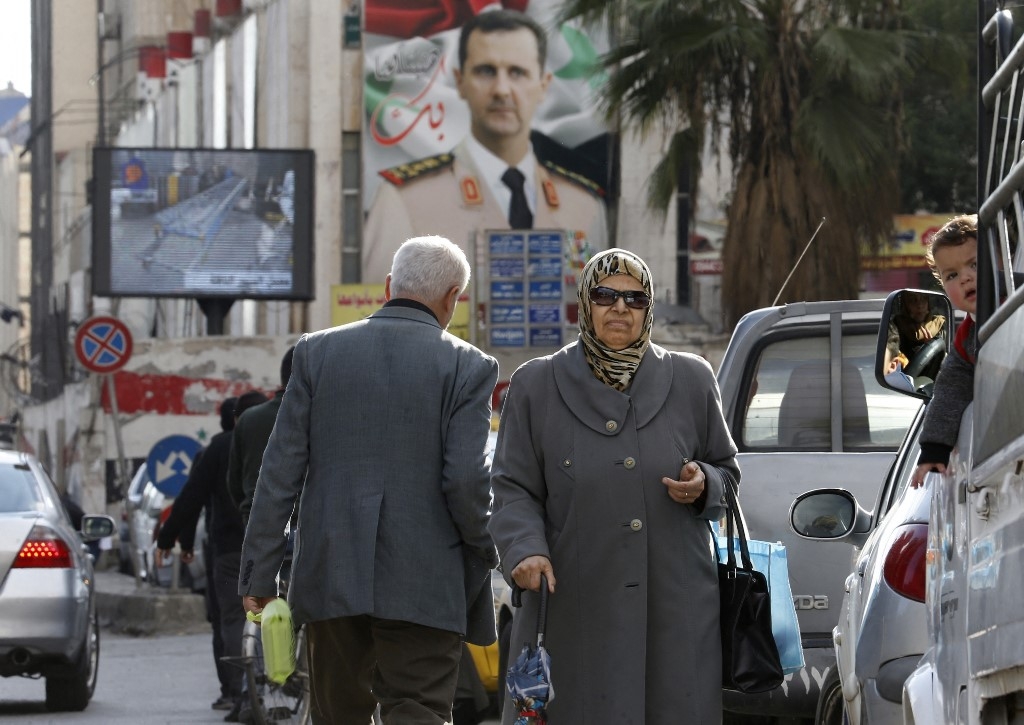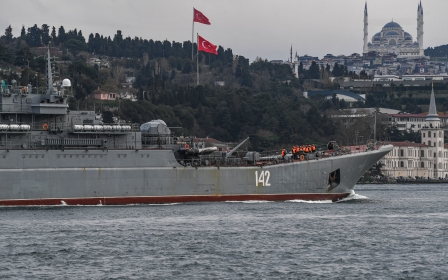Syria: Protests mount amid anger over 'unfair' cuts to government subsidies

Hundreds of people took to the streets of Sweida on Friday to demand better living conditions after the government earlier this month excluded a large number of people from its subsidies programme in a country where 90 percent of the population live in poverty.
Calls for protests in the southern city as well as other government-controlled areas such as Tartus and Latakia had been spread in the media following the implementation of the cuts.
The government had announced it would stop supporting the price of bread, sugar, and fuel for the richer elements of society. However, thousands of poor families were excluded either due to administrative errors or other pretexts, such as the family's breadwinner living abroad or owning a business.
Protests have been ongoing in Sweida since Sunday and a state-supported food distribution centre in the central Syrian Masyaf region was destroyed in response to the government action.
Even staunch government supporters have criticised the move end the subsidies, leaving Damascus facing serious problems.
Stay informed with MEE's newsletters
Sign up to get the latest alerts, insights and analysis, starting with Turkey Unpacked
“We are only asking for a living," a protester said in a video published by Sweida SNA, a France-based news network.
"We are calling on the corrupt government and every corrupt person to step down."
Another civilian told the network that “officials are sitting in mansions, they don't feel poor."
"We can no longer buy clothes for our children, we can barely feed them,” they said.
Describing the lifting of the subsidies as a failure, others told the network that many Sweida residents were also attempting to emigrate.
'Double the price'
Meanwhile, local sources told Middle East Eye that former National Defence fighters, a pro-government militia set up to fight rebels, rather than citizens, had been pivotal in starting the protests.
One source said that as the fighting in the country had decreased, the former fighters had "moved to work in the black market, which was paralysed after the subsidies stopped".
"They used to buy subsidised materials at a cheap price from wealthy families who do not need these materials, and then sell them on the black market at double the price,” he added.
“However, the protests gathered civilian support to demand a better economic situation and an end to government corruption, which raised the security authorities’ fears and pushed them to the city.”
'The protests gathered civilian support to demand a better economic situation and an end to government corruption, which raised the security authorities’ fears and pushed them to the city'
The state has been promoting its decision to lift subsidies for months, hosting pro-government analysts on the media to praise the need to implement the decision.
On 29 January, the Council of Ministries said that work was underway to deliver subsidies solely to those in real need.
Days later, state-run Sham FM radio said that the first phase would exclude some 600,000 families from support - around 15 percent of the country's families - because they owned cars.
“Some 687,000 people have left the country while still benefiting from subsidies,” Fadia Suleiman, deputy minister of communications, told the radio, adding that if the person who left was the head of the family, "the whole family will be excluded from the subsidies, but if one of its members leaves we stop their subsidies alone".
The rules stated that families with more than one car, or a car dating from 2008 and after, with an engine displacement of more than 1500cc, would no longer receive the subsidies.
Anyone who had several properties, a registered commercial licence document, a tourism investment, or an industrial workshop, were also excluded from the subsidies.
'This is crazy'
“Imagine they halted the subsidies for my neighbour, claiming that her husband is abroad," a member of a Damascus-based family told MEE.
"This has already happened with thousands of other families, while they are in the country.
“Most families have commercial licensing documents not because they are traders, but because this makes it easier to enter and go out to visit their relatives who are refugees in the surrounding countries.
“Commercial licensing is not a standard yardstick for family income. It can be obtained by paying bribes to employees, who will make you the largest trader or industrialist in the country on paper.
“We used to say that most people are poor, but today I assure you all people are poor.
"As soon as the decision began, food prices rose between half and one dollar. This is crazy,” she added.
'Stupid card'
Just days after the implementation, the Council of Ministries held a meeting to discuss the thousands of objections that had arrived through electronic links made available by the Ministry of Communications and the Takamol company, which run the smart card project through which the subsidised goods are distributed.
The government began using the smart card system in 2019 to distribute fuel amid a severe energy crisis in the country.
Tea, rice, and sugar were added in 2020, and bread in 2021.
Syrians refer to it as "the stupid card" as there have been many problems with its use.
Through the card, each family can buy a maximum of 1.1kg of bread a day at a price of 200 Syrian pounds (5.5 US cents). People can buy additional bread without subsidies for between 1,200 and 1,500 Syrian pounds (33 to 40 US cents).
Each car has a specific monthly fuel allowance and every subsidised litre of petrol is sold through the card at 1100 Syrian pounds (30 US cents), while the black market price is 2500 Syrian pounds (68 US cents).
For diesel, the subsidised price is 500 Syrian pounds (13 US cents) and the unsubsidized price is 1700 Syrian pounds (46 US cents).
The average monthly income in Syria is about 70,000 Syrian pounds (about $20) but local residents told MEE that a family needs around the equivalent of $275 to survive.
Win support of the people
The Damascus family who spoke to MEE said that they do not receive all the subsidised food because it is often in very bad condition, and if they do receive it they sell it.
This winter they said they had received only 20 litres of diesel for heating.
“I sold the [fuel] on the black market like everyone else and I sold the heater basically," said a family member.
"It makes no sense to leave the heater on to run 20 litres of diesel for four days during the winter.”
Government subsidies date back to the era of former Syrian President Hafez al-Assad, who used them to try to win the support of the people.
The country's currency collapsed during his rule, from three Syrian pounds to the dollar in 1985, to 47 Syrian pounds to the dollar in 2000, the year of his death.
That same year, following mounting public pressure over the pound's fall in value, Assad blamed the government which he sacked.
From 47 Syrian pounds to the dollar, when Bashar al-Assad, Hafez's son, succeeded him in 2000, the currency now stands at 3,625 pounds to the dollar.
Rare criticism
Syria is currently under Western sanctions as a result of its violent crackdown on civilian opponents since anti-government protests began in early 2011.
The sanctions, Covid-19 pandemic, and the rapid devaluation of the local currency have all helped to compound the country's economic crisis.
Bashar al-Assad has often adopted the same approach as his father, dismissing the government from time to time to relieve pressure from the street, and allowing little criticism of his rule.
However, late last month, in a rare moment, the prominent television actor Abbas al-Nuri criticised the ruling Baath Party and the president almost directly, arguing that military rule had exhausted the country's economy over the past decades.
“Freedoms in Syria have been removed since the military came to power and overthrew democracy, the constitution, and culture,” said the 69-year-old actor.
After loyalists criticised Nouri, describing him as a traitor and saying he had violated the country's constitution, the actor apologised via Sham FM radio.
Meanwhile, other criticism targeted the president's actions personally.
On his personal webpage, Kenan Wakkaf, a pro-state journalist, published a sarcastic post on 4 February stating that “meeting with artists is important, but the decision to lift subsidies and protests in Sweida... is very unimportant”. He attached a picture of the president meeting with actress Sulaf Fawakherji and her husband, film director Wael Ramadan.
Two days later, Wakkaf said that security forces surrounded his house, and he was then detained, provoking calls from Reporters Without Borders for his release.
On Monday, Buthia Shaaban, an Assad advisor, attacked all voices critical of the government, describing the protests in Swedia as a "fifth column".
Middle East Eye delivers independent and unrivalled coverage and analysis of the Middle East, North Africa and beyond. To learn more about republishing this content and the associated fees, please fill out this form. More about MEE can be found here.





